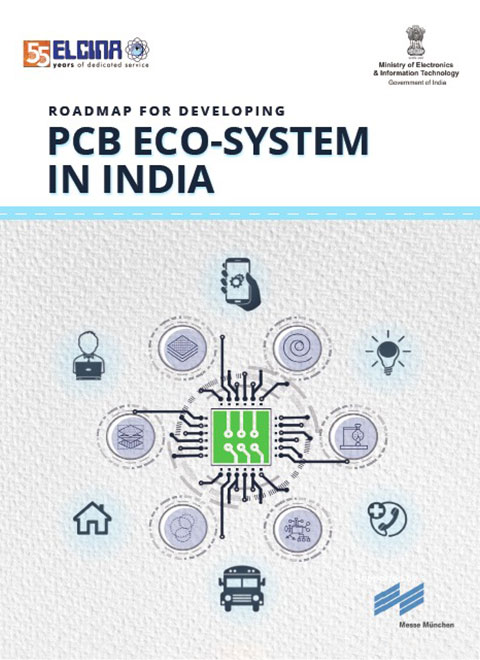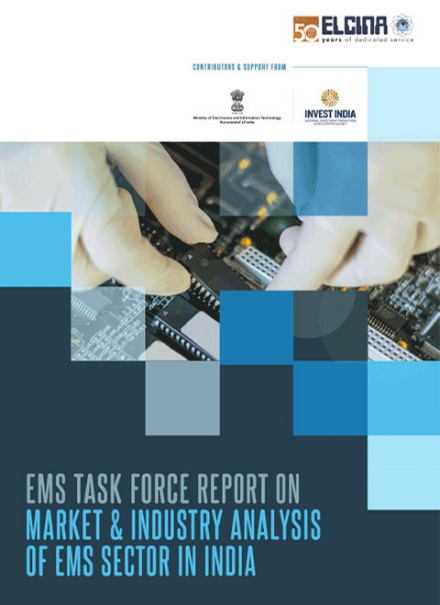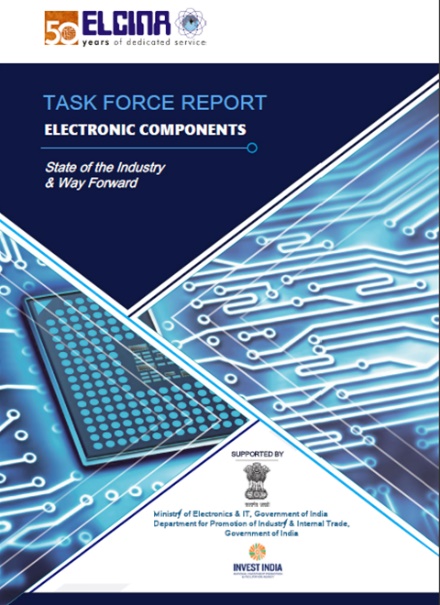|
Limited progress in design, component
manufacturing in electronics industry: Economic Survey
Indigenous electronics production increased
multifold in the last 10 years to reach Rs 9.52 lakh crore
in 2023-24, the Economic Survey said but pointed out that
the industry has largely focused on assembly, making limited
progress in design and component manufacturing. However,
India's electronics market represents 4 per cent of the
global market, the survey, which was tabled in Parliament on
Friday, said. Programs such as Make in India and Digital
India, along with improved infrastructure, ease of doing
business, and various incentives, have boosted domestic
manufacturing and drawn foreign investments. However,
India's electronics market represents 4 per cent of the
global market. The industry has largely focused on assembly,
with limited progress in design and component manufacturing.
According to the survey, domestic production of electronic
goods has increased substantially from Rs 1.90 lakh crore in
FY15 to Rs 9.52 lakh crore in FY24, registering a compound
annual growth rate (CAGR) of 17.5 per cent.
Source: https://www.deccanherald.com/,
January 31, 2025
Presumptive
tax regime is likely to draw global talent in electronics
The government’s budgetary proposal for a new
presumptive taxation regime for non-Indian residents
providing services to electronics manufacturing companies
operating in India is likely to help these companies attract
top global talent easily, government sources have said. This
has been a long-standing demand. Although semiconductor and
electronics manufacturing companies currently employ a
handful of foreign nationals, manufacturing in both sectors
are now moving into their next phase, where the number of
foreign nationals working directly or employed to train
Indian nationals will increase manifold. By fostering a more
predictable tax environment, these measures are expected to
attract greater foreign participation, streamline
operations, and enable the sector to access top global
talent, said Kunal Chaudhary, tax partner at EY India. Under
the new presumptive regime, which will take effect on April
1, the government has proposed that only 25 per cent of the
total remuneration received by non-residents will be treated
as taxable profits.
Source: By Aashish Aryan, https://www.business-standard.com/,
February 02, 2025
POLICY SCAN
ELCINA Applauds Union Budget 2025-26:
A Transformative Move for India’s Electronics Manufacturing
Landscape
ELCINA
appreciates the forward-looking Union Budget for 2025-26
presented by Hon’ble Union Finance Minister, Smt. Nirmala
Sitharaman. With a vision to transform India into a global
electronics manufacturing hub, the budget proposes
substantial reforms in tariff rationalization, incentives
for manufacturing, and an emphasis on boosting high-tech
industries such as semiconductors, artificial intelligence
(AI), and lithium-ion batteries.
The Union
Budget 2025-26 provides a timely and much-needed push to the
electronics manufacturing sector and showcases the
government’s commitment to facilitating its growth and make
it a global player. The Budget has emphasized its focus on
electronics sector by significantly enhancing funding for
key areas such as semiconductors and AI, rationalizing
tariffs, and incentivizing local production by reducing
tariffs on inputs and enhancing allocation for PLI Schemes.
A
Transformative Allocation for Electronics & Semiconductor
A Key aspect
of the 2025-26 Budget is the dramatic increase in funding
for the Ministry of Electronics and Information Technology (MeitY)
which highlights the emphasis of the government of this
sector.
Funding Allocation Overview:
|
Category |
Revised 2024-25 (₹ Cr.) |
Budget 2025-26 (₹ Cr.) |
Change (₹ Cr.) |
% Increase |
|
Gross Allocation |
17,566.31 |
26,026.25 |
+8,459.94 |
+48% |
|
Semiconductor & Display Manufacturing |
3,816.47 |
7,000.00 |
+3,183.53 |
+83% |
|
Production Linked Incentive (PLI) Schemes |
5,777.00 |
9,000.00 |
+3,223.00 |
+56% |
|
India AI Mission |
173.00 |
2,000.00 |
+1,827.00 |
+1,056% |
|
SCL Mohali Modernization |
11.00 |
400.00 |
+389.00 |
+3,536% |
The
allocation of ₹7,000 crore for semiconductor and display
manufacturing is a game-changer. It marks an 83% increase,
underlining the government’s resolve to reduce India's
dependence on foreign-made chips and increase domestic
manufacturing capacity. The 56% higher allocation of Rs
9000 Cr to PLI Schemes augurs well for large-scale
electronics and IT hardware manufacturing.
Additionally,
the IndiaAI Mission has been allocated Rs 2000 Cr which
marks multifold increase of 1,056%, indicating that AI is
firmly at the center of India’s future technological growth.
The funding boost to SCL Mohali's modernization highlights
the strategic priority given to strengthening domestic
chip-making capabilities.
Streamlining Tariffs for a Competitive
Ecosystem
ELCINA applauds the step taken to simplify
the customs tariff structure. Seven tariff rates have been
removed, reducing the total tariff rates to eight including
zero tariff which will improve efficiency.
Furthermore,
82 tariff lines have been exempted from the Social Welfare
Surcharge (SWS), lowering the import costs for several
critical inputs and reducing documentation and ease of doing
business enhancing competitiveness of domestic
manufacturers.
Duty Revisions to Promote Local
Manufacturing
The government has made strategic changes to
the Basic Customs Duty (BCD) on several critical components,
with a view to strengthening the domestic manufacturing
base. These revisions aim to reduce reliance on imports and
encourage local production. Key revisions include:
|
Component |
Previous BCD |
Revised BCD |
|
Open Cell for TV Panels |
2.5% |
Nil |
|
Interactive Flat Panel Displays |
10% |
20% |
|
Parts of Open Cells |
2.5% |
Nil |
|
Ethernet Switches (Carrier-Grade) |
20% |
10% |
While BCD on
inputs have been reduced, duty on IFPD has been increased to
encourage local manufacturing of the final product. ELCINA
feels that this will provide a significant boost to the
domestic manufacturing of television panels, interactive
flat panels, and to Ethernet switches. However, in
subsequent years these inputs, such as Open Cell for TV
Panel and Parts of Open Cells also should be manufactured
locally to further enhance value addition.
Reduction
in Basic Customs Duty (BCD) from 2.5% to Nil on key inputs
for mobile phone manufacturing. This includes critical
inputs/parts or sub-parts for manufacture of PCBA, Camera
Modules, Connectors, Wired Headsets, Microphones &
Receivers, USB Cables, and Fingerprint Readers/Scanners. As
per demand of the Mobile phone industry, this move aims to
reduce production costs, enhance the competitiveness of
India's mobile phone sector and increase value addition.
We believe
that the above two steps revising duty structure would
encourage the growth of module manufacturing and components
eco-system.
Boost to Lithium-Ion Battery & EV
Ecosystem:
In a clear move to bolster India’s green energy transition,
the budget proposes duty-free imports for lithium-ion
battery manufacturing equipment. Additionally, new
incentives have been introduced for the production of EV
batteries, with 35 capital goods added for EV battery
manufacturing and 28 for mobile phone battery production.
These measures
are expected to drive significant growth in the electric
vehicle (EV) sector, which is poised to be a major
contributor to India’s clean energy goals. With this
support, India is set to become a global leader in EV and
energy storage solutions.
Strengthening the ‘Make in India’
Vision:
The Union Budget 2025-26 also aligns with the
government’s long-term ‘Make in India’ vision by correcting
inverted duty structures and reducing dependency on imports.
This budget supports local component manufacturing and
incentivizes sectors such as electric vehicles (EVs) and
energy storage, which are critical to India’s transition
toward a greener and more sustainable future.
Trade Facilitation & Regulatory Ease:
The budget also reduces regulatory burdens on importers by
amending the Customs (Import of Goods at Concessional Rate
of Duty for Specified End Use) Rules, 2022. Key amendments
include extending the time limit for fulfilling end-use
obligations from six months to one year and replacing
monthly compliance filings with quarterly statements. This
has been a long standing recommendation from ELCINA and will
bring much-needed relief to component manufacturers who need
to import inputs at concessional rates.
Dr.
Sasikumar Gendham, President of ELCINA and Managing Director
of Awesense Five, commented: “The Union Budget
2025-26 has set the stage for India’s rise as a global
electronics manufacturing powerhouse. The government's focus
on enhancing semiconductor production, increasing support
for AI, and boosting the PLI scheme will provide a strong
foundation for the sector's future growth. The simplified
tariff structure and revised duties are steps in the right
direction to foster a competitive manufacturing environment
in India."
Shri Rajoo
Goel, Secretary General, ELCINA, added: "We welcome
the significant reforms introduced in this budget,
particularly the focus on tariff rationalization and
increased funding for key sectors like semiconductors, AI,
and EV manufacturing. However, to achieve self-reliance in
electronics manufacturing, we urge the government to
introduce a dedicated Component Manufacturing Incentive
Scheme and allocate a dedicated fund for the same. This is
vital for driving investments in core components and their
raw materials, creating a sustainable eco-system and
strengthening our position in the global electronics supply
chain."
ELCINA strongly believes that the measures
outlined in the Union Budget 2025-26 will act as a catalyst
in realizing India’s vision of becoming a global leader in
electronics manufacturing. There is a need to maintain this
momentum and provide necessary incentives to promote
development and manufacturing of components and raw
materials. The revised enhanced investment and sales
turnover limits proposed in the budget are a step in the
right direction as this will strengthen MSME’s.
By promoting
local production, encouraging innovation in high-tech
industries, and simplifying trade regulations, the
government has laid a solid foundation for the future of
India’s electronics sector. As India moves forward with
these transformative reforms, ELCINA remains committed to
working closely with the government and industry
stakeholders to drive growth, innovation, and self-reliance
in the electronics manufacturing sector.
TOP
INDUSTRY SCAN
General
Jagiroad semiconductor plant to bring
Assamese youth back home: CM Sarma
Chief Minister Himanta Biswa Sarma has
expressed confidence that the upcoming semiconductor plant
in Jagiroad will serve as a catalyst for reversing the trend
of youth migration, encouraging many Assamese to return to
their home state for employment opportunities. Speaking on
the progress of the plant's construction, Sarma highlighted
a significant shift as many young professionals working
outside Assam have already returned. Following the
commencement of construction at the Jagiroad semiconductor
plant, a large number of Assamese youth working outside the
state have decided to come back and offer their services to
their homeland. Sarma also shared that his government is
engaging with various industrialists to boost local
employment further. The Chief Minister also expressed
optimism regarding the timeline of the project, stating that
the construction and chip production could commence by the
end of the year.
Source: https://assamtribune.com/, February
2, 2025
MoSPI and IIIT-Delhi Collaboration to
Modernize Official Statistics
In a significant step towards modernizing
India’s National Statistical System, the Ministry of
Statistics and Programme Implementation (MoSPI) has signed a
Memorandum of Understanding (MoU) with Indraprastha
Institute of Information Technology, Delhi (IIIT-Delhi)
under its Data Innovation Lab initiative. The agreement,
signed on January 30, 2025, aims to enhance data collection,
processing, and dissemination through cutting-edge
technologies such as Artificial Intelligence (AI), Machine
Learning (ML), and Big Data Analytics. The Data Innovation
Lab was launched in July 2024 as part of MoSPI’s efforts to
bring research-driven solutions into official statistics. It
serves as a hub for leveraging emerging technologies to
improve data quality and enable real-time analytics. Over
the past year, MoSPI has undertaken several initiatives to
reform and modernize statistical methodologies, making them
more responsive to the needs of policymakers and
stakeholders.
Source: https://egov.eletsonline.com/,
February 01, 2025
Two-Wheeler EV Sales Jump 24% MoM In
January, Ola Electric Reclaims Top Spot

Bhavish Aggarwal-led Ola Electric reclaimed
its top position in India’s electric two-wheeler (E2W)
market in January 2025, surpassing legacy players TVS Motor
and Bajaj Auto in terms of escooter sales. This comes after
Ola Electric lost the title to Bajaj Auto and TVS Motor in
December 2024 amid rising competition in the two-wheeler EV
space. Total electric two-wheeler registrations in India
climbed nearly 24% month-on-month (MoM) to 91,264 units in
January, according to Vahan data as of January 31, 2025. In
December 2024, two-wheeler EV sales hit an 8-month low of
73,651 units. The uptick in E2W registrations was led by Ola
Electric, which saw registrations of its electric
two-wheelers zoom 64% to 22,656 units in January from 13,794
units in the preceding month. With this, its market share in
the electric two-wheeler market increased to 25% in January
from 19% in the previous month.
Source: By Amit Singh, https://inc42.com/,
February 02, 2025
TOP
Information Technology
India to take up Biden's AI chip
export curbs with Trump govt
India will raise the issue of the US imposing
a country-specific cap on exports of AI compute and
foundational models with the incoming Donald Trump
administration, a senior official told ET. The Ministry of
Electronics and Information Technology (MeitY) has held
"initial discussions" with various arms of the government,
including national security advisor (NSA) Ajit Doval's
office, and has shared analysis and concerns pertaining to
the move by the outgoing Joe Biden US administration. "We
really have to take it up with the new government once it
comes in," the official said. The cap could be detrimental
to India's tech industry in the long term even if it's not
an immediate crisis for the country, the person added. The
government will raise the issues under the India-US
Initiative on Critical and Emerging Technologies (iCET)
framework, the official said.
Source: By Surabhi Agarwal, January 21, 2025
Budget 2025: Smartphones, TVs To Get
Cheaper? What FM Nirmala Sitharaman Said
The FM, in her eighth straight Budget speech,
proposed to add 28 additional capital goods for mobile phone
battery manufacturing to the list of exempted capital goods.
This will boost the manufacturing of domestic lithium-ion
batteries for phones and the overall smartphone ecosystem.
The exemption of duties will also likely reduce the prices
of smartphones. The custom duty on inputs/parts and
sub-parts of PCBA, camera module, connectors and inputs or
raw materials for the use in the manufacturing of wired
headsets, microphones and receivers, USB cables, fingerprint
readers/sensors of mobile phones has been reduced from 2% to
zero. Also, custom duty on specified inputs/parts (chip on
film, PCBA, glass board/substrate cell) for use in the
manufacturing of open cells of TV panels of LED/LCD TV has
been fully exempted.
Source: https://www.ndtvprofit.com/, February
01, 2025
India considering lowering tariffs on
some high-end products from US
India is considering lowering tariffs on some
high-end products from the United States, including specific
steel, luxury motorcycles, and electronic goods, a report in
NDTV Profit said, citing sources. This move, expected to be
confirmed when Finance Minister Nirmala Sitharaman presents
the budget on Saturday, might not significantly impact
Indian industries. India currently imposes duties of over
100 per cent on 20 items imported from the US. The potential
tariff cuts come just a day after US President Donald Trump
criticised India, China, and Brazil for imposing high
tariffs. During a conversation with House Republicans, Trump
stated, “We’re not going to let that happen any longer…
we’re going to put America first,” referring to these
countries as “tremendous tariff makers.” His comments
reflect ongoing frustrations with trade imbalances,
particularly with countries that impose high duties on US
goods.
Source: By Md Zakariya Khan, https://www.business-standard.com/,
January 29, 2025
Raw material export, import of
finished products can’t be accepted: Modi
Prime Minister Narendra Modi called
innovation and quality products two pillars of the expansion
of the Indian economy while stressing rapid growth is
impossible only through raw material export. He underlined
that the export of raw materials and import of finished
products cannot be accepted and that this trend and value
addition outside the country was being changed. Modi called
innovation in the service sector and quality products two
pillars of the economy’s expansion. “The country’s rapid
growth is not possible only through the export of raw
materials. Hence, we are changing the entire ecosystem and
working with a new vision,” said Modi in his inaugural
speech at the two-day Utkarsh Odisha Conclave of investors
in Bhubaneswar.
Source: By Debabrata Mohanty, https://www.hindustantimes.com/,
January 28, 2025
TOP
Consumer Electronics
India's semiconductor market to grow
at 13%, reach $103 bn by 2030
India's semiconductor market is expected to
grow from $52 billion (Rs 4.5 trillion) in 2024 to $103.4
billion (Rs 9 trillion) by 2030, says a report by Business
Standard. The report, assessed by The Financial Express,
attributes this growth to major sectors including mobile
handsets, information technology (IT), telecommunications,
consumer electronics, automotive, aerospace, and defence.
Mobile handsets, IT, and industrial applications alone
contribute to nearly 70 per cent of the semiconductor
industry's revenue and are anticipated to remain the primary
drivers of growth. India's semiconductor consumption market
is projected to reach $52 billion in 2024-25 and is expected
to grow at a strong compound annual growth rate (CAGR) of 13
per cent through to 2030. Sectors such as automotive and
industrial electronics present considerable opportunities
for added value.
Source: https://www.business-standard.com/,
January 29, 2025
Samsung to locally manufacture S25
series of AI smartphones in Noida plant

South Korea’s Samsung Electronics Co Ltd will
locally manufacture its latest Galaxy S25 series of flagship
AI smartphones at its Noida facility in India, a top company
executive said. Indian engineers played a significant role
in the development of the S25 series' AI features. The S25
series, equipped with the powerful Snapdragon® 8 Elite
chipset, aims to enhance user experience with improved
performance and AI capabilities. Samsung has three R&D
centers in India and its Bengaluru research unit is its
biggest outside South Korea. Park was speaking in San Jose
shortly after Samsung announced a high-octane launch of its
Galaxy S25 series of premium AI smartphones, including the
Galaxy S25 Ultra, the Galaxy S25+ and Galaxy S25, at the
Galaxy Unpacked event in the Silicon Valley.
Source: By Kalyan Parbat, https://economictimes.indiatimes.com/,
January 22 2025
Appliances, display business to
contribute 50% to India topline in next 3 years: Samsung's J
B Park
Consumer electronics major Samsung expects
its appliances and display business to scale up
substantially in India, contributing to half of the topline
in the next three years, J B Park, President & CEO of
Southwest Asia has said. The current penetration of consumer
electronic products in India is still low, a major market
for the South Korean Chaebol, however, it is expected to
scale up, helped by factors such as the rise of the Indian
economy and middle class. Samsung is aggressively expanding
its play into the consumer electronics segment by
democratising the latest features such as AI in the
appliances and display segment (QLED and OLED TVs), which is
helping it to gain significant market share in the premium
segment. However, penetration of India's smartphone segment
has matured and is slightly behind the developed countries,
where people carry more than one device for their needs.
Source: https://economictimes.indiatimes.com/,
January 22, 2025
India moving up the global electronics
value chain: Rajeev Chandrasekhar
India has established a notable presence in
global electronics value chains and innovation over the past
4 to 5 years, driven by the Union government's emphasis on
export-led electronics manufacturing, said former Union
Minister of State for IT Rajeev Chandrasekhar. Delivering a
special address at Times Network's Digit Zero1 Awards 2024,
Chandrasekhar highlighted that global and Indian electronic
brands have begun manufacturing in India in the last 3-4
years due to a strategic policy shift. his transformation
across the value chain-design, manufacturing, and
testing-has been enabled by the Government of India's pivot
from an import substitution framework to export-led
electronics manufacturing and design framework.
Source: https://economictimes.indiatimes.com/,
January 21, 2025
TOP
Telecom
Government allocates ₹95,298 crore to
Telecom & IT sectors

Finance Minister Nirmala Sitharaman on
Saturday, February 1, proposed ₹95,298 crore for the
information technology and telecommunications sectors. While
presenting the Union Budget for 2025-26, Sitharaman also
proposed to reduce the basic customs duty on carrier-grade
ethernet switches from 20% to 105, bringing the component at
par with non-carrier-grade ethernet switches. The
compensation the government pays telecom service providers
for creating infrastructure saw a substantial jump — ₹28,400
crore, up from ₹13,700 crore last year. In the full Budget
for 2024-25, presented in July 2024, the Centre announced a
substantial allocation of ₹1.28 lakh crore for telecom
projects and public sector firms under the Department of
Telecommunications, with a significant emphasis on BSNL.
Source: By Vijay Anand,
https://www.cnbctv18.com/, February 01, 2025
boAt demands anti-dumping duty on
realme earwears

Smart wearable maker Imagine Marketing, which
sells products under the boAt brand name, has asked the
government to impose anti-dumping duty on realme earwears,
according to sources. boAt-led True Wireless Stereo (TWS)
audio wearable segment had around 34 per cent market share
in the second quarter of 2024, while realme was ranked 5th
with 6.4 per cent share, according to the market research
firm IDC. boAt has approached the government for imposing
anti-dumping duty on realme TWS. Senior officials from boAt
have also presented their case to the Ministry of
Electronics and IT. The proposal is being evaluated by the
government. boAt had posted a 5.1 per cent year-on-year
growth in the second quarter of 2024, while realme had
registered growth of 77.1 per cent in the second during the
same quarter.
Source: https://economictimes.indiatimes.com/,
January 29, 2025
Global tech cos may move court against
govt's 6GHz decision
Technology majors such as Google, Facebook,
Microsoft and Cisco, smarting from a bitter defeat in India
in their bid to gain access to the coveted 6GHz airwaves,
are open to challenging the government's decision in court.
India recently approved the auction of low-frequency 6GHz
spectrum band for use by telcos to offer wireless telephony
services using technologies like 5G and 6G, rejecting tech
companies' claims to these airwaves. Tgovernment to
delicense the lower 500 MHz of the 6GHz band and an
additional 160 MHz from the 300 MHz to be held back until
2030. But clearly our recommendations have fallen flat as
per the latest decision. Technology company executives
separately told ET that there are sufficient grounds to
challenge the decision in courts as it does not align with
global practices.
Source: https://economictimes.indiatimes.com/,
February 01, 2025
5G services launched in all states,
UTs by October 2024: Economic Survey 2024-25

All states and union territories had 5G
services launched by October 2024, according to the Economic
Survey 2025 released on Friday. Currently, 5G services are
available in 779 out of 783 districts, with over 4.6 lakh 5G
Base Transceiver Stations (BTSs) installed nationwide.
Indian Telecom service providers such as Reliance Jio and
Bharti Airtel, have been rolling out the 5G network across
the country since October 2022. The rollout of 5G services,
along with the introduction of new policies aimed at
enhancing telecommunications infrastructure and user
experience, has played a crucial role in digital
connectivity. The survey also highlighted that India’s
telecom sector is expanding, driven by the smartphone boom,
surging data consumption, and the introduction of
technologies like 5G.
Source: https://www.newindianexpress.com/,
January 31, 2025
Government allocates ₹95,298 crore to
Telecom & IT sectors
Finance Minister Nirmala Sitharaman on
Saturday, February 1, proposed ₹95,298 crore for the
information technology and telecommunications sectors. While
presenting the Union Budget for 2025-26, Sitharaman also
proposed to reduce the basic customs duty on carrier-grade
ethernet switches from 20% to 105, bringing the component at
par with non-carrier-grade ethernet switches. The
compensation the government pays telecom service providers
for creating infrastructure saw a substantial jump — ₹28,400
crore, up from ₹13,700 crore last year. In the full Budget
for 2024-25, presented in July 2024, the Centre announced a
substantial allocation of ₹1.28 lakh crore for telecom
projects and public sector firms under the Department of
Telecommunications, with a significant emphasis on BSNL.
Source: By Vijay Anand,
https://www.cnbctv18.com/, February 01, 2025
TOP
EV’s & Auto Electronics
India’s Bold Electric Mobility
Revolution: Budget Boost Sparks Change
India is charging ahead with a thrilling
boost to its electric mobility initiative, as unveiled in
the Union Budget 2025-26. With a funding leap of over 20%,
the allocation for electric mobility schemes surged from Rs
4,434.92 crore to an impressive Rs 5,322 crore. This
progressive enhancement aims to transform road transport
into a sustainable powerhouse, phasing out fossil fuels and
nurturing the burgeoning electric vehicle (EV) industry.
Leading the charge is the PM Electric Drive Revolution in
Innovative Vehicle Enhancement (PM E-DRIVE) Scheme,
witnessing a staggering increase of over 114% to Rs 4,000
crore. This ambitious program, launched in September 2024,
promotes various electric vehicles and the installation of
public charging stations. Another key player, the Scheme to
Promote Manufacturing of Electric Passenger Cars in India (SMEC),
doubled its budget to Rs 12 crore, fueling India’s potential
to compete globally in EV manufacturing and creating
countless job opportunities.
Source: By Clara Maxfield, https://motopaddock.nl/,
February 01, 2025
EV Battery Production Gets Boost, BCD
Exemption On 35 Additional Goods
To support the demand for electric vehicles
in the country, the union minister announced the addition of
35 capital goods to the list of materials exempted from
Basic Custom Duty (BCD). These exemptions are aimed at
bringing down the cost of manufacturing EV batteries in
India. Specifically, it provides exemption for crucial raw
materials like scrap from lithium-ion batteries, Cobalt
powder, waste cobalt, lead, zinc, along with 12 other
critical minerals. The initiatives presented in Budget 2025
are anticipated to benefit local manufacturing, leading to
increased job opportunities within the industry. With the
rising demand for electric vehicles in the country, these
steps aim to establish India as a strong contender in the
international EV market.
Source: Amulya Raj Srinet, https://www.ndtv.com/,
February 01, 2025
Hero
MotoCorp’s electric vehicle business to become fully
independent unit

Hero MotoCorp Ltd announced on Friday that it
would move the electric vehicle and Emerging Mobility
Business Unit (EMBU) into a fully independent unit from
February 1. The EMBU was created by the automaker in 2019 to
drive innovations in emerging mobility, including electric
vehicles. The EV & Emerging Mobility Business Unit will
transition to a fully independent and empowered unit,
"leading the EV revolution and next-generation mobility
under the mentorship of the Executive Chairman Pawan Munjal,"
the company said in an exchange filing. "As part of this
strategic shift, the Product Development teams across EMBU,
Hero Tech Centre Germany (TCG) and Hero Centre for
Innovation and Technology (CIT) will work in synergy to set
new industry benchmarks."
Source: By Kiran Murali, https://www.autocarpro.in/,
January 31, 2025
Auto stocks rally as budget boosts EV
adoption with Solar PV cells and battery ecosystem
Auto stocks surged on February 1 after the
Union Budget 2025 introduced measures to accelerate electric
vehicle (EV) adoption and ramp up infrastructure. Finance
Minister Nirmala Sitharaman announced a slew of initiatives
to build an ecosystem for solar PV Cells & EV Batteries.
Investors cheered the announcements, driving gains across
key auto stocks. Maruti Suzuki rallied over 6 percent as the
Budget’s focus will also likely benefit the company as it is
set to launch its maiden electric vehicle in 2025. The
company’s first EV, the E-Vitara, set to launch under its
premium NEXA brand, will come with a 500+ km range, advanced
safety features, and global market aspirations. The positive
momentum also stems from solid January sales which witnessed
an uptick of 6.5 percent. Mahindra & Mahindra, the
top-performing Nifty 50 auto stock of 2024, added over 2
percent, buoyed by incentives for local battery
manufacturing.
Source: https://www.moneycontrol.com/,
January 31, 2025
TOP
Defence & Solar
Allocation to power sector up 30%,
rooftop solar plan gets big push
Finance minister Nirmala Sitharaman has
allocated Rs 48,396 crore towards the power sector,
including new and renewable energy, in her Budget for the
financial year 2025-26. The outlay is an increase of 30
percent over the previous year’s allocation of Rs 37,143
crore (revised estimate) and 22 percent over the budget
estimate of Rs 39,602 crore. Of the Rs 48,396 crore, the
power ministry received Rs 21,847 crore and the ministry of
new and renewable energy (MNRE) Rs 26,549 crore, the Budget
document tabled in the Parliament on February 1 shows. The
biggest share of Rs 16,021 crore from the power ministry
funds went to the revamped distribution sector scheme, a key
component of which is prepaid smart metering, system
metering, and distribution infrastructure upgrades. The
scheme received Rs 12,665 crore (RE) in the FY25 Budget.
Source: By Sweta Goswami, https://www.moneycontrol.com/,
February 01, 2025
Govt allocates ₹1,500 crore to solar
power grids
The Union Budget of 2025 on Saturday
(February 1) has allocated ₹1,500 crore to the solar power
(grid) segment, reinforcing India’s commitment to renewable
energy transition. Last year, the Finance Minister allotted
over ₹8,000 crore to the segment, significantly up from
₹4,757 crore earmarked in the FY23-24 revised estimate. In
recent years, the country's solar power sector has
experienced rapid growth, aligning with the government’s
agenda for sustainable development and energy security. In
2022-23, the allocation surged to ₹3,304.03 crore, a record
high compared to ₹2,369.13 crore in 2021-22. Even in
2020-21, when the allocation stood at ₹2,449.65 crore, it
was already a significant amount. These allocations mark a
transformative period in financial planning and resource
distribution, with each year setting a new benchmark for
future growth.
Source: By Ashutosh Patki,
https://www.cnbctv18.com/, February 01, 2025
PM-Surya Ghar crosses 8.5 lakh solar
rooftop units as India targets 1,800 GW green energy by 2047
PM-Surya Ghar, India's flagship solar
initiative, has crossed 8.5 lakh rooftop installations,
marking significant progress towards the goal of powering 10
million households with solar energy, according to Minister
of New and Renewable Energy, Pralhad Joshi. The government
aims to achieve 500 GW of renewable energy capacity by 2030,
with a long-term vision of 1,800 GW by 2047. The target
would position India as a global leader in renewable energy
while meeting its energy needs and contributing to global
decarbonisation efforts. The minister said that India's
renewable energy capacity has already increased from 75 GW
in 2014 to over 220 GW showing notable growth in the sector.
Source: https://www.zeebiz.com/, January 31,
2025
Union Budget: Centre sets aside ₹6.8
lakh crore for defence
The Centre on Saturday set aside more than
₹6.8 lakh crore for the defence sector in the Union Budget
for FY2025-26, including ₹1.8 lakh crore for the
modernisation of the military, whose shopping list includes
new fighter jets, helicopters, warships, submarines, tanks,
artillery guns, drones, and rockets and missiles. A
significant portion of the modernisation outlay has been
allocated for buying weapons, systems and equipment from
domestic suppliers to achieve the self-reliance goal, a top
priority for the Narendra Modi government. The year’s
allocation is 9.5% higher than what it was in the budget
estimates ( ₹6.22 lakh crore) for the financial year
2024-25, and around 6% more than last year’s revised
estimates ( ₹6.41 lakh crore), budget documents showed. To
be sure, finance minister Nirmala Sitharaman did not spell
out the defence allocation in her budget speech.
Source: By Rahul Singh, https://www.hindustantimes.com/,
February 01, 2025
TOP
MSME
(Special section of the MSME related news under ELCINA Micro
& Small Industry Forum)
Budget 2025: Export Promotion Mission
to boost MSME exports
Finance
Minister Nirmala Sitharaman presented four engines of
development for Viksit Bharat - agriculture, micro, small
and medium enterprises (MSMEs), investments and exports.
Sitharaman, while presenting Budget 2025 today in the
Parliament, defined exports as the fourth engine of growth,
and said that an Export Promotion Mission, jointly driven by
the Ministries of Commerce, MSME and Finance, will help
MSMEs, which account for 45 percent of exports, tap into the
export market. A digital public infrastructure,
BharatTradeNet (BTN) for international trade, has been
proposed as a unified platform for trade documentation and
financing solutions. The finance minister also proposed
various exemptions on duties and tariffs to boost exports.
"India’s seafood exports in the last financial year touched
an all-time high of more than Rs 60,000 crore.
Source: https://www.itln.in/latest-news,
February 01, 2025
Boost for MSMEs, classification
investment cap to be hiked 2.5 times
Finance Minsister Nirmala Sitharaman, while
presenting Union Budget 2025 mentioned the government would
prioritise the MSME (micro, small and medium enterprises)
sector of the country. The government said that the
investment limit for MSME classification to be made 2.5
times. Also, the turnover limit for MSME classification
would be doubled. This would not only pace up the country's
manufacturing sector, scale up and innovate the MSME sector,
but would also provide employment opportunities for
countless youth across the country. To help them achieve
higher efficiencies of scale, technological upgradation and
better access to capital, the investment and turnover limits
for classification of all MSMEs will be enhanced to 2.5 and
2 times respectively. This will give them the confidence to
grow and generate employment for our youth.
Source: https://www.indiatoday.in/, February
01, 2025
MSMEs: Govt To Start National
Manufacturing Mission To Boost Make In India
In her budget, Finance Minister Nirmala
Sitharaman has said that the central government will set up
a national manufacturing mission for small, medium and large
industries to strengthen Make In India by providing policy
support and execution. Sitharaman stated that investment and
turnover limits for the classification of micro, small and
medium enterprises (MSMEs) enhanced. She added that with
quality products, MSMEs are responsible for 45 per cent of
India's exports. Notably, the cash-strapped MSME sector
contributes about 30 per cent to India's gross domestic
product (GDP). The union budget 2025-26 has introduced
several enhancements to the credit guarantee cover for MSMEs
and startups. For micro and small enterprises, the credit
limit has been increased from Rs 5 crore to Rs 10 crore,
with an expected additional credit of ₹1.5 lakh crore over
five years.
Source: https://www.businessworld.in/,
February 01, 2025
TOP
ELCINA EVENTS , ACTIVITIES & SERVICES

For more information, please contact:
Rajesh Rawat – 9911445890 /
rajesh@elcina.com
TOP
ELCINA Publications

https://elcina.com/roadmap-for-developing-pcb-eco-system-in-india |
Roadmap For Developing PCB
Eco-System in India
Key Findings
-
Indian PCB market and industry size in terms of
domestic production, exports, and imports
-
Growth drivers and challenges (needs & gaps) in
the Indian PCB industry
-
Growth potential of PCB manufacturing in India
and identify enablers for creating &
strengthening the domestic value chain
-
Key inputs required viz. investments,
technology, and infra eco-system
Details of key PCB value chain players – global and
domestic, who can be invited to invest to establish
a strong PCB industry |
|

https://elcina.com/ems-task-force-report-on-market-industry-analysis-of-ems-sector-in-india |
EMS Task Force Report
Key Findings
-
Currently EMS Industry (Contract Manufacturing
Services) are valued 832 Bn $ and are projected
to grow 1055 Bn by 2025.
-
Domestic electronics manufacturing is estimated
at USD 75 Bn of which 39 Bn constitutes EMS
value. This is divided into 23.5 Bn domestic
Mfg. and USD 15.5 Bn PCBS/Sub-Assembly imports.
-
Further USD 53.5 Bn is finished Electronic Goods
imports of which USD 17 Bn is EMS value. Thus
total EMS opportunity loss is US$ 32.5 Bn (15.5
+17).
-
The report estimates that EMS production can
grow realistically from USD 23.5 Bn today to USD
152 Bn by 2025 at CAGR of 45%. This will meet
75% of the countries EMS requirement of US$ 203
Bn by 2025 against a total estimated market of
400 Bn.
|
|

https://elcina.com/elcina-task-force-report-on-electronic-components |
ELCINA Task Force Report on
Electronic Components
Key
Findings
-
Current status of component manufacturing in
India – Areas of competence vs Gaps and
inadequacies
-
Components which urgently require investments
and growth in domestic manufacturing
-
Emerging technology and new components for
upcoming opportunities
-
Constraints and bottlenecks to be addressed
-
Overcoming Policy constraints, WTO (ITA-1)
deadlock and Zero Duty issue
-
Strategy for overcoming these constraints
-
Eco-System requirements- Role of Central and
State Governments
|
|

https://elcina.com/elcina-directory-of-indian-electronics-industry |
ELCINA Directory of Indian
Electronics Industry 2024-25
Description
-
ELCINA Directory of Indian Electronics Industry
– includes the updates on Indian Electronics
Industry and a host of additional improved
features covering business environment,
statistical industry scan, company databases
plus various projections. This handy compendium
with its easy-to-read format attracts the
attention of a growing number of users (within
India and abroad)
-
Apart from electronics industry, the users of
this Directory range from financial
institutions, commercial banks, FIIs,
Consultancy organizations as well as industry
promotion institutes across the world….
|
TOP
FORTHCOMING EVENTS & GENERAL INFORMATION
TOP
|
A newsletter published by ELCINA, New
Delhi. The information contained in this newsletter
is for private circulation only. Despite our best
efforts, some errors could have crept in. You are
advised to verify authenticity of the information
before further use.
Electronic Industries Association of India (ELCINA
)
ELCINA House, 422 Okhla Industrial Estate,
Phase-III, New Delhi 110020 (India).
E-Mails:
info@elcina.com
Tel: 011-41615985,
41011291,
Website:
www.elcina.com
|
|